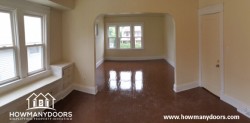Find Out Why
Our Rental Property Calculator
Seems Magical But Isn’t
Any rental property calculator needs to focus on including real and accurate income and expense data. Input bad data and get a bad return. Miss an expense and poof! your return shrinks faster than you can blink. It’s unfair to suggest any rental property calculator will give you 100% accurate income and expense data, but in today’s online world it should at least give you a head start.
To get a good calculation on the income and expense data for your rental property return it’s best to research the local area and talk to people in the business of renting. When doing your due diligence there’s a lot to think about when coming up with your estimates:
Income
- What’s the real rental property income? Start by obtaining a copy of a lease to know it’s real. Look up the potential rent using online resources, and pick up the phone and call a local property management company that knows the area. The rental property calculator on HowManyDoors has already taken data feeds of online sources to calculate your rent so it just needs adjusting with any actual or new lease fees.
- How long will it be vacant? Keep that local property management company on the phone and ask them to give you their opinion about vacancies in the area. Online sources also can give you local estimates, but don’t confuse rental vacancy with unoccupied (foreclosed or empty housing). We’ve taken an industry average and populated it with your street address so you don’t forget to include this important expense in your rental property calculations. If, after your own research, you find it needs to be adjusted just type in the new figure. The rental property calculator is that simple.
- Get some real documentation and evidence! If it’s already leased or a turnkey rental property ask for a copy of recent monthly statements from the property management company or bank statement showing income. If it’s Section 8 or a government-subsidized program then get a copy of the approved subsidy. Call the local agency and confirm it is current.
Expenses
- What’s my property tax? It’s easy to look up online what last year’s taxes were for a given property. But don’t just stop there--when buying a rental property you need to have a sense for your go-forward expense based on your purchase price. Our rental property calculator contains the tax rate by region and is adjusted for the current value to create a calculation that can be adjusted.
- What you need to know is tax levies for each property-tax jurisdiction in a particular area are calculated separately, and then added together to determine a tax rate for an entire region. We took this published tax rate and applied it in our rental property calculator to create an estimated property tax rate. If you’re looking to buy a property take last year’s rate and bill, look at the assessed value and compare it to the price you are considering paying. Some jurisdictions are slow to adjust (every five years), and others each year based on the last sale price. You may have a year or two before the property is reassessed and taxes change, or maybe it’s up for an assessment next year. It’s not an exact science, but if you know tax rates will change and property values will be assessed every so often you can anticipate a change and prepare yourself.
Don’t over complicate things, but don’t assume a tax bill that is based on an assessed value, which is half of what you plan to pay, will last forever!
- How much to insure? This is a personal matter based on your appetite for risk. In our opinion landlords should be getting fire and theft insurance and a decent liability policy, plus any local provisions such as hurricane insurance. These can be estimated based on purchase price. Included in our rental property calculator is a suggestion for minimum coverage, but it is wise to get a quote from a provider and input it. Taxes and insurance are combined into one field in the rental property calculator to make it easier to read and less of a laundry list for the calculator. So it is best to figure out the monthly tax and insurance needed and make any adjustments.
- What are my management fees? This one requires you to check in with the property manager and ask how much for leasing fees (the cost to lock in a renter) and how much for management fees (monthly cost of managing the rental property for you). Ask for a list of typical service fees (lock replacement, snow removal, eviction, etc.). It’s also handy to get a copy of the lease agreement, management contract and copy of the monthly income statement for the rental property (or sample).
To keep it real-world and simple we’ve assumed a 10% management fee in our rental property calculator and then assumed that some of the service fees will be covered by the maintenance and repair budget (e.g., lock changes). The leasing fee can be included in the vacancy budget or just increase the management fee slightly. Either way, once you find out what that fee is don’t forget to include it.
- What’s the cost to repair and maintain this place? Now we are entering unchartered territory for the beginner investor (and to some extent the expert). The largest factors for maintaining a rental property include:
- Age and condition of the property
- The tenant demographic and their actual respect for the property
- The location and climate (crazy-cold snow, water or heat damage)
A good rule of thumb for investors trying to figure out the annual expense of maintaining a rental property is to first get a solid understanding of the condition of the property including the roof, furnace, hot water heater, air conditioner, foundation etc. Then allocate 1 to 3 percent of the purchase price for regular annual maintenance, depending on the condition, age and size of the house.
We’ve created our rental property calculator to use the best data sources available including size and age of the home, but it doesn’t have the critical view on condition. So take the opportunity to add some improvement investment as part of the total cash invested to get it rent-ready, and then play with your monthly repairs and maintenance budget knowing that we’ve assumed your rental property is in rent-ready condition. Also if you have Homeowner’s Association (HOA) fees you can adjust these down accordingly.
- Are there any HOA fees? HOA fees are almost always charged to condominium owners, and in some cases to single family homeowners, too. The fees cover the costs of maintaining the common areas in the complex such as lobbies, patios, landscaping, swimming pools and elevators. The association may charge special assessments if the HOA's reserve funds are not sufficient to cover a major repair, such as a new roof – so read the documents and understand if there are any pending improvements needed (maybe the reason for a quick sale or good deal!). If you are buying a condo with an HOA then expect your insurance and maintenance to be significantly lower and adjust accordingly. A few hundred bucks gets you insurance on a 2-bedroom condo and you don’t own the roof!
- Do I pay any utilities? It’s very common for owners to pay at least some of the utilities; the two often covered are water and sewer. Unfortunately, these bills are not a fixed amount so you have to estimate these expenses. For example, if you own a property with a pool you should assume that your water bill will be higher in the summer. If you pay gas the bill will be higher in the winter. The utility companies and a good property manager should be able to give you some solid estimates of how much the utilities are for your desired property. In addition you may be able to add a clause in the lease that puts a cap on what you’re willing to pay for utilities. Anything over the amount you set is the responsibility of the tenant. However, if it is Section 8 or any other government-subsidized program, this may not be an option. The rental property calculator does not include estimates for utilities because not all of them are a fixed cost, and who pays which bill is not standard. In addition utility companies are not required to disclose that information. Discuss with your property manager or whoever draws up your lease so you are prepared and input those figures in the HOA/Utilities field.
- What about legal and professional fees? These fees vary from state to state, and on your personal preference. New York, for example, requires an attorney to review all property purchase documents. So right up front, there’s an additional cost of a few hundred dollars. Depending on the state and/or property manager there may be an additional fee to execute an eviction, often another few hundred dollars. Be sure these fees are stated in your contracts and you factor in the costs. You may be lucky and never have to evict a tenant; but if you do, make sure you have the funds set aside.
- What’s my mortgage payment? If you have one, don’t forget to include it! Some rental property calculators will factor this in as a separate line item, and others you will have to type it in under other costs. You can also measure your return if you have a mortgage payment by learning how to calculate your cash-on-cash return. This is the ratio of annual before-tax cash flow to the total amount of cash invested, expressed as a percentage.
Want to see what’s important in any calculator? There are 3 important factors that investors often forget or do incorrectly. Read about them here.
Our rental property calculator is almost magical – by simply typing in an address you get an estimated return on your real estate investment. But really there’s no guesswork here – real-time industry data is used from various agencies to provide you with the information you need to assess whether you’re making a good investment. And it’s variable, too! If you know your property manager is going to be you, for example, you can type in “0” for that expense and you’ll automatically see the change in your return.
HowManyDoors has so much information to help you have a clear picture of your income and expenses to input in our rental property calculator. Read on to learn many other tips and how to’s that will prepare you to become a rental property owner.
Being a “dummie” is optional
Our investment property calculator can tell you a lot, but do you really have a grasp on real estate investment know-how? Read six quick, FREE How-To articles and learn the basics in under 45 minutes. Start the first How-To now
Cash flow-producing, turnkey investment property
Take a virtual tour of a turnkey rental property that’s professionally managed and already producing cash flow - a great option for beginners (and pros alike) who want to get into real estate investing. You’ll find more available on our site
We’re not in Kansas anymore!
Sometimes the best investment property opportunities are in another state. Don’t let that stop you - use our handy guide on the ins and outs of buying properties out of state.
Start Now!




